Greg Sover is Making a Scene

HOME PAGE
 |
 |
 |
 |
 |
 |
 |
 |
 |
 |
 |
Making a Scene Presents an Interview with Greg Sover
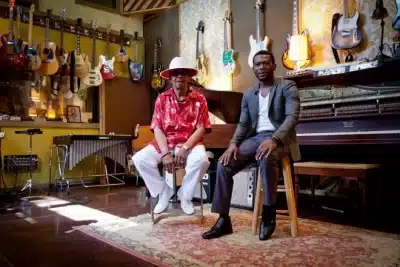
While Greg Sover’s friends in his Philadelphia neighborhood, where he grew up, were listening to local rappers he was immersed in classic rock, country and the blues ever since he first picked up a guitar at the age of five.
“From the beginning, it’s been the greats that have intrigued me,” says Sover, naming Jimi Hendrix, Stevie Ray Vaughan, Eric Clapton, Jeff Beck, Duane Allman, Dwight Yoakam guitarist Pete Anderson and, of course, all three Kings – B.B., Freddie and Albert as early influences. “Hearing those first few notes of ‘Purple Haze’ changed my life.”
On his fourth and latest album “His-Story” to be released by his own independent Grounded Soul Records label on July 21, 2023, Sover’s musical career has come full circle, as he’s joined on two songs by legendary Jimi Hendrix Experience and Band of Gypsies bassist Billy Cox, a cover of “Manic Depression” and a rare track from the great guitarist, “Remember,” originally recorded for the international version of Jimi’s first album, “Are You Experienced”.
“It was such an honor and privilege to play with him,” says Sover. “I had to keep pinching myself that it was Jimi Hendrix’s bass player, but I got to know and respect him as his own man, too. He and his wife were so supportive. They just want to pass it on.”
Sover and Cox hit it off right away, and after working remotely on the two tracks, they got together in Billy’s hometown of Nashville to collaborate on a live video for “Remember,” a song that starts with a reggae lilt and ends with a funky jam straight out of James Brown by way of Archie Bell and the Drells’ “Tighten Up.” Cox, who also co-produced the track with Sover, recalled how he and Jimi were on the way to re-record the song before he passed away, and that Billy wanted to do it with Greg as a form of homage, impressed with Sovers’ “humility” and dedication to his craft.
“I listened to the original track quite a few times, but I had to come up with my own version of the guitar solo at the end, because it was so underplayed, I could hardly make it out,” acknowledges Sover. Recorded at Cambridge Studios in south Philadelphia, the new album turns the spotlight on Sover as a true triple-threat – already known for his world-class guitar work, he is now blossoming as both a soul/R&B singer (listen to his come-hither croon on the atmospheric “Tonight”) and a songwriter (from the heavy metal psychedelic blues of “Song 28” to the rousing “Gimme Shelter” gospel shout of “Freedom Part 2”), with 8 of the 10 self-produced tracks original compositions. Other standouts include the delta blues and AC/DC Angus Young histrionics of the title track, the slinky blues of “Stuck in the Rain,” which could be about either a broken romance or overcoming career obstacles (“I’m trying to keep the flame from going out/But I’m stuck in the rain”) and the chugging locomotive riffs of “One Way Train,” about the inevitable call of the road and music taking one away from their loved ones. Sover’s fourth album shows remarkable growth… he is not just a blues performer but a true purveyor of rock n’ roll/Americana music, ready to both accept the torch from those who came before and pass it on to those following him.
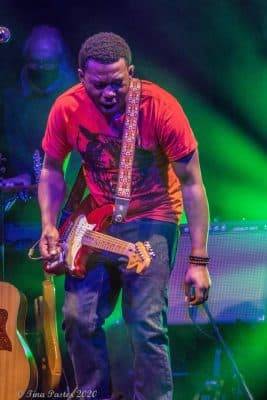 The self-declared Brooklyn-born guitar ‘slinger was “mesmerized” by the feminine curves of the acoustic instrument owned by his father, a Haitian immigrant who moved the family to a one-bedroom apartment in the Crown Heights section. That’s where his dad would play Kompa tunes for his son – a rhythmic native music from his homeland described by Greg as most resembling salsa. The first English-language songs he remembers hearing as a child were Cyndi Lauper’s “Time After Time” and Bob Marley’s “Get Up, Stand Up,” when his father gifted him with his own instrument, not a toy, but a real guitar, small enough for a kid to use. “I stuck with it,” he says about teaching himself how to tune to the open E-chord and eventually play. “It was something I loved to do and still love to do.”
The self-declared Brooklyn-born guitar ‘slinger was “mesmerized” by the feminine curves of the acoustic instrument owned by his father, a Haitian immigrant who moved the family to a one-bedroom apartment in the Crown Heights section. That’s where his dad would play Kompa tunes for his son – a rhythmic native music from his homeland described by Greg as most resembling salsa. The first English-language songs he remembers hearing as a child were Cyndi Lauper’s “Time After Time” and Bob Marley’s “Get Up, Stand Up,” when his father gifted him with his own instrument, not a toy, but a real guitar, small enough for a kid to use. “I stuck with it,” he says about teaching himself how to tune to the open E-chord and eventually play. “It was something I loved to do and still love to do.”
Greg cut his performing teeth as a bassist in the church while in his teens, then played guitar in various bands, including heavyweight champion Joe Frazier’s group, before “muscling up” as a vocalist and bandleader himself. Sover soon became an integral part of the local Philadelphia music scene, releasing two full-length albums, 2016’s Songs of a Renegade (S.O.A.R.) and 2018’s Jubilee, and 2020’s Parade six-song EP, performing locally and at festivals with the likes of the David Uosikkinen’s In The Pocket, Yardbirds, Jeffrey Gaines, Jimmy Vivino, Tommy Conwell & the Young Rumblers, Walter Trout, Sonny Landreth, Popa Chubby and the Marcus King Band. Sover and his band made the semifinals for two consecutive years at the International Blues Challenge in Memphis and won the 2015 Hard Rock Rising competition at Philadelphia’s Hard Rock Cafe in 2015.
Among the classic rock songs Sover has covered are Cream’s “Politician,” Buddy Miles’ “Them Changes,” Mountain’s “Theme from an Imaginary Western,” Jimi Hendrix’s “Manic Depression” and “Voodoo Child,” all not mere carbon copies, but brings his own distinct flair for melodies in service of the song rather than just mindless shredding. His City of Brotherly Love roots – Gamble and Huff’s Philadelphia International, the street-corner R&B of local groups such as the Stylistics and Delfonics – come across even more clearly in new songs like “Tonight,” hinting at new expansive directions for the future. His new bandmates include such icons as veteran bassist Kenny Aaronson, the fellow Brooklyn native who has played with everyone from Bob Dylan, Rick Derringer, Billy Idol, Joan Jett and Sammy Hagar to the New York Dolls, Foghat and Hall & Oates, and drummer/podcast host David Uosikkinen of Philly’s the Hooters, whose founding member Rob Hyman, ironically, was one of the co-writers of “Time After Time.” “They keep me growing as a musician,” he adds.
“It’s freedom time/Is freedom free?” “Freedom Part 2”
“It’s all about who loves the music,” says Greg about expanding the audience, getting more people to hear his music and see him play live. “It’s all about crossing these boundaries and bringing everyone together, whatever your race, religion or nationality. As for me, I’ve been through it all… it’s too late to stop now. Just go for it. The show must go on.”
One-On-One With Greg Sover
Mike Greenblatt, author of Woodstock: Back To Yasgur’s Farm, speaks to fellow Hendrix-Head Greg Sover,
about HIS-STORY, Sover’s fourth album, Released July 21 on his own Grounded Soul Records.
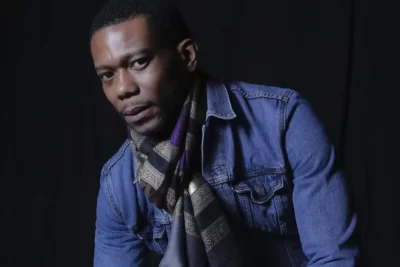 MG: Congratulatons. I just finished listening to all 10 tracks of HIS-STORY. You’re really moving the music forward. Your intenton is clear. The Jimi connecton is strong. You got some great guys with you. I was lucky enough to see Jimi jam with Sly Stone at a small Greenwich Village club in 1969. I love what you did with “Manic Depression,” complete with Band Of Gypsies bassist Billy Cox. And what a rarity you pulling out Jimi’s “Remember”!
MG: Congratulatons. I just finished listening to all 10 tracks of HIS-STORY. You’re really moving the music forward. Your intenton is clear. The Jimi connecton is strong. You got some great guys with you. I was lucky enough to see Jimi jam with Sly Stone at a small Greenwich Village club in 1969. I love what you did with “Manic Depression,” complete with Band Of Gypsies bassist Billy Cox. And what a rarity you pulling out Jimi’s “Remember”!
GS: It was only released in Europe originally, and posthumously in the States. Jimi wanted to redo that song with Billy Cox but his untmely death stopped that from happening. Billy suggested we do that one. The word through the grapevine is that it’s been collectng dust in the vault.
MG: I can’t imagine how Billy must’ve felt when Jimi passes so unexpectedly considering the musical plans they had together.
GS: It stll gets to him to this day. You could hear it when he speaks about Jimi. It goes beyond missing his good friend. Billy was truly devastated. It was so abrupt. Don’t forget how close they were. They were in the Army together. They were friends when Jimi was with Mitch Mitchell and Noel Redding in the Experience. They were best friends when he and Jimi were with drummer Buddy Miles in The Band Of Gypsies. You don’t talk to Billy nowadays about that subject. I asked him once and that was it.
MG: God knows what they could’ve done together had Jimi lived. The song itself is a surprisingly sweet melodic upbeat tune. You said when you first heard it, the original guitar solo by Jimi “was so underplayed, I could hardly make it out.”
GS: That’s correct. There was a solo secton where you could profoundly hear the beginning but you had to strain to hear exactly what he was doing at the tail end of it. It was just so hard to hear. I don’t know if it was a mixing thing or not. I’m pretty sure he was playing something that he had clean in his mind at the tme but it was just so buried in the mix. Not that I had to make up my own solo, but I had to really concentrate to hear what he was trying to do. So I put my own personal spin on that.
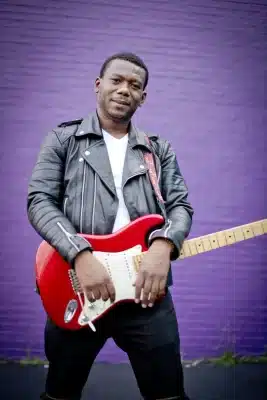 MG: Billy Cox has been already quoted as saying that Jimi would’ve loved what you did with it. How’d you get to hook up with him?
MG: Billy Cox has been already quoted as saying that Jimi would’ve loved what you did with it. How’d you get to hook up with him?
GS: Through our managers. I had this crazy idea about recording a cover of “Manic Depression.” I mean, that song just fit the album so well in terms not only musically but on topic and what I was trying to talk about lyrically. So my manager reached out to his manager and Billy reached back out to us. We went to Nashville from my home base of Philadelphia, met up with him, and found he was such a cool guy. We met his family and friends too. We wound up doing a video together.
MG: You really made “Manic Depression” come alive. That’s a song ripe for interpretaton, especially today.
GS: That’s a lot of heart right there in that partcular song. I didn’t want to just show the listener that I could play Jimi Hendrix. I wanted to show how I could listen to Jimi Hendrix to come up with something both on course as well as adding modern flair. Pay atenton to the traditon. Not rearrange. Not making it obscure, but adding a modern twist to what Jimi brought to the table to make me love that song in the first place. There’s some true chaos going on in that song.
MG: It’s almost as if Jimi’s ghost is a spectral presence hovering over these 10 tracks, not just the two covers with Cox. Your lyrics for “Freedom Part #2” delve into the Black experience of trying to live peacefully in America. Jimi wrote and recorded the original “Freedom” as a credo of personal liberation with Cox and drummer Mitch Mitchell just months before he died in London September 18, 1970. It was released posthumously as the opening track on The Cry Of Love, March 5, 1971.
GS: Along with that experience, it’s the whole “fight for freedom” aspect. I’ve observed that whenever somebody does something in the name of freedom, they’re either ridiculed or cancelled out. The song is about our freedoms, the protests, the necessary reaction to things, like how football player Colin Kaepernick—whether you agree with him or not—had the freedom to take a knee during the National Anthem in protest at how Blacks are treated in this country. He was ridiculed for that. There’s been other instances as well. I was attacking a society that rails against such personal values when I wrote “is freedom mine? Is freedom free? Because look at the pain freedom’s costing me!” I mean, think about it, if every time we make an act of freedom like Colin Kaepernick did at the expense of his career, you’re put down or made fun of. You’re ridiculed. You’re cancelled and not existent anymore. That knee one player took kinda started everything. He made a major sacrifice for what he believed.
MG: That’s the mark of a great piece of music, that you can expound upon important themes, yet make it sound so damn good that it’s let to the listener as to whether they want to go deep to truly understand or just wanna groove at the impeccable playing on a more surface level. Both are valid. Similarly, “Dark House” is so damn mysterious and dramatic, no wonder you made it the opening track! It sets the scene, so to speak, for the rest of the record.
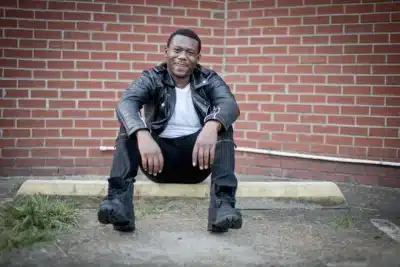 GS: Yeah, that’s why it’s the opener. I have a core audience now. I wanted to give them a little something different. I’ve been in a blues-rock bag for so long, it was time. “Dark House” is a true story. My mom had passed away. I had to take care of the house. There were times I just had to leave and stay with a friend overnight but I’d always have to return to that dark house. The lights were out. It had no power. My aunt—living there at the time—would light candles. I’m Haitian, and I used a Haitian vernacular that most people won’t understand but it means “you can’t hide.”
GS: Yeah, that’s why it’s the opener. I have a core audience now. I wanted to give them a little something different. I’ve been in a blues-rock bag for so long, it was time. “Dark House” is a true story. My mom had passed away. I had to take care of the house. There were times I just had to leave and stay with a friend overnight but I’d always have to return to that dark house. The lights were out. It had no power. My aunt—living there at the time—would light candles. I’m Haitian, and I used a Haitian vernacular that most people won’t understand but it means “you can’t hide.”
MG: It’s very cinematic.
GS: Thank you for that. Plus I thought it sounded cool. It’s like you said. Most will dig the vibe without knowing the meaning but that’s cool too.
MG: That duality of just good rockin’ music or music-with-message is up to the listener. You got it goin’ on both ways. “Temptaton” has a Stevie Ray Vaughan Texas blues vibe to it.
GS: I’m a huge Stevie Ray fan. I remember learning blues guitar from a good friend of mine in Philadelphia who used to tell me, “don’t play too much of that SRV stuff.” To me, I stll think you get a splash of Philly in it but it does give out that reminder as far as pure sound of what its roots are.
MG: Stevie Ray loved Jimi. Covered him up amongst the best of anybody. Over and above Billy Cox, you got some real heavyweights in your band: David Uosikkinen, the drummer of The Hooters, and bassist Kenny Aaronson who’s played with everyone from Bob Dylan, Rick Derringer and Billy Idol to Joan Jet and Hall & Oates.
GS: We’ve played only a few shows together but boy do they fit! I was introduced to Dave and Kenny and we kinda just hit it off. We’re cut from the same musical cloth. That rock’n’roll/classic rock/blues cloth. So we dug each other immediately from that end of things. They’re such a pleasure to play with. Love those guys. That Kenny—beyond who he’s played with—is one bad-ass player. Oh my goodness! The guy can play! He can really shred on that bass. I asked him about playing with Dylan and he just said Dylan stays to himself and doesn’t interact much offstage with the guys in his band.
MG: I heard you don’t speak to him unless he speaks to you first. And you’re told beforehand to avoid eye contact.
GS: Kenny told me he keeps to himself. A lot of artists, once they reach a certain level, are like that. Not sure, though, if there’s any artist who has reached Bob’s particular level. He’s above an icon. I don’t know what the designation would be for someone like him.
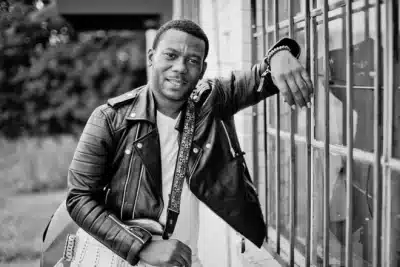 MG: You’ve played guitar in so many bands. Tell me about playing guitar in boxer Joe Frazier’s band. That’s a real Philly thing!
MG: You’ve played guitar in so many bands. Tell me about playing guitar in boxer Joe Frazier’s band. That’s a real Philly thing!
GS: Unfortunately, it was all in rehearsal. Before we had our first gig, he had to go to the hospital. And he passed away shortly thereater. I won my audition and was really psyched. It’s a shame. I was ready to go, man. I mean, he seemed fine. I was talking to him and he had this really young girlfriend at his side. Next thing I hear, he’s really sick. And he didn’t make it. I only got to rehearse with him once after the
audition.
MG: Where was that picture taken of you and your red Strat on the cover of HIS-STORY?
GS: Nashville in front of an HBCU [Historically Black College or University]. On Jefferson Street, just a few doors down, there was a “Battle of the Guitars” that Jimi was in and lost because of equipment failure. I don’t even think he was Jimi Hendrix yet. He probably was still Jimmy James at the time. The guy who won just happened to have a better amp. So he won by default. A lot of great musicians passed by that street. It’s a historic location.
MG: So HIS-STORY is coming out on your own label, Grounded Soul.
GS: Yes, my manager and I own the label. He’s my partner in this project. We’re trying to make it into a real label, not just an avenue for myself. I mean, I do want to get established a little more with my own record but we hope to sign other artists at some point. I like the concept of keeping the legacy going, and helping a whole lot of artists on the way up. Help them not to make some of the mistakes I’ve made. Give them the kind of opportunities I didn’t have.
MG: I understand you co-produced HIS-STORY as well. Tell us of the creative process.
GS: Jim Salamone, who’s worked with Sigma Sound, is a good friend. He’s a real serious cat. As far as the process goes, I’ll write the songs, record the demo versions with my guitar and a drum-beat sample before taking it into Cambridge Studios in south Philly to get the band behind it with Dave on drums and Kenny on bass. I’ll redo my guitar and vocals, and we’d produce and arrange. We’d add what we have to add, and redo the solos until they’re just right. I’m very proud of this album.
MG: It’s your fourth.
GS: I’m proud of Songs of a Renegade in 2016, Jubilee in 2018 and Parade in 2020. But HIS-STORY shows the growth. I was kinda still figuring things out on the first two. Parade shows some understanding of the process, at least to me, although I was a little short, it having only seven tracks. So now, with me knowing what I know, especially as I wrote it, I feel I finally put it all together. It’s a little more polished but still shows the innocence I want in my music. The raw aspect. You never want to get too polished. I feel like I definitely know what I’m doing now. I’m 38, and feel young enough to put what I’ve learned into practice. I feel no different from when I was 17. It’s all about how you feel. I’ll be 70 and still feel like this. Age is not real. Time is not real. It’s all an illusion
Buy Us a Cup of Coffee!
Join the movement in supporting Making a Scene, the premier independent resource for both emerging musicians and the dedicated fans who champion them.
We showcase this vibrant community that celebrates the raw talent and creative spirit driving the music industry forward. From insightful articles and in-depth interviews to exclusive content and insider tips, Making a Scene empowers artists to thrive and fans to discover their next favorite sound.
Together, let’s amplify the voices of independent musicians and forge unforgettable connections through the power of music
Make a one-time donation
Make a monthly donation
Make a yearly donation
Buy us a cup of Coffee!
Or enter a custom amount
Your contribution is appreciated.
Your contribution is appreciated.
Your contribution is appreciated.
DonateDonate monthlyDonate yearlyYou can donate directly through Paypal!
Subscribe to Our Newsletter
Discover more from Making A Scene!
Subscribe to get the latest posts sent to your email.














































